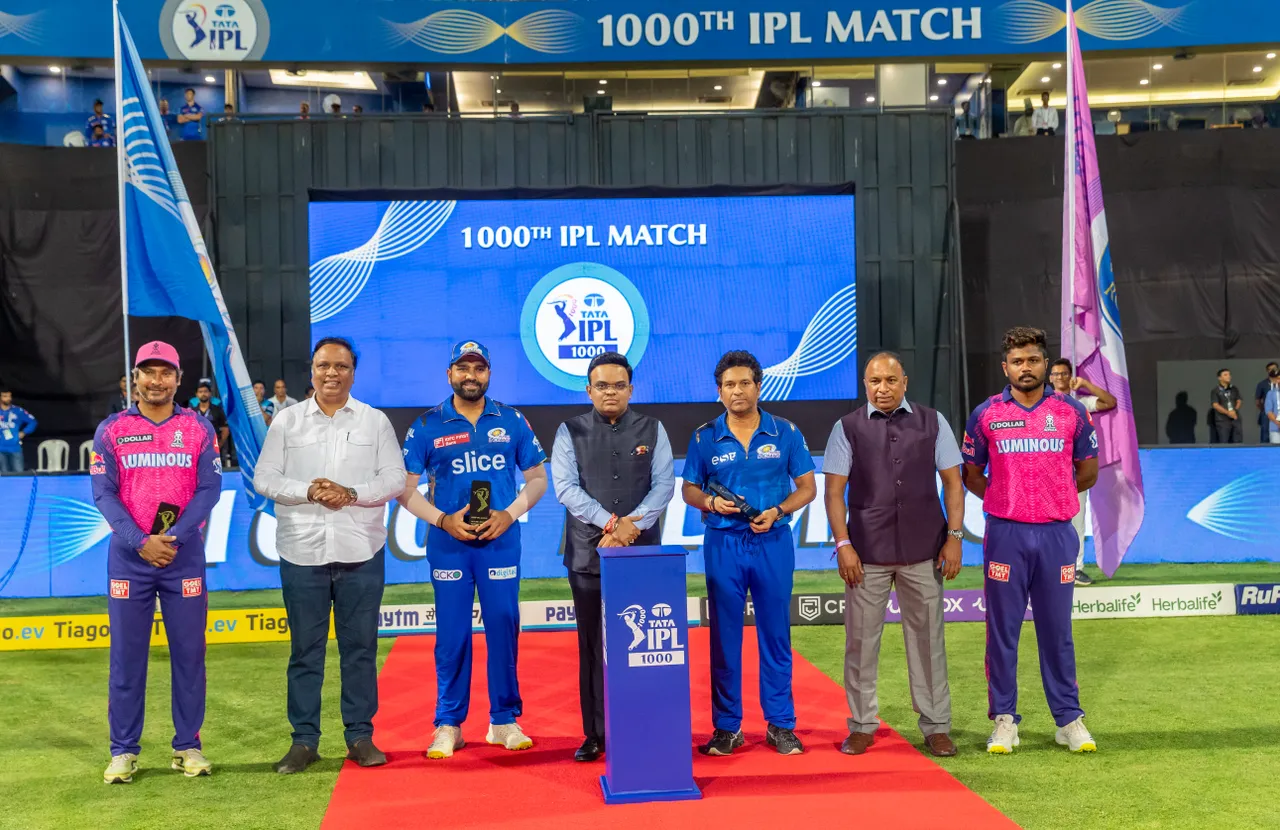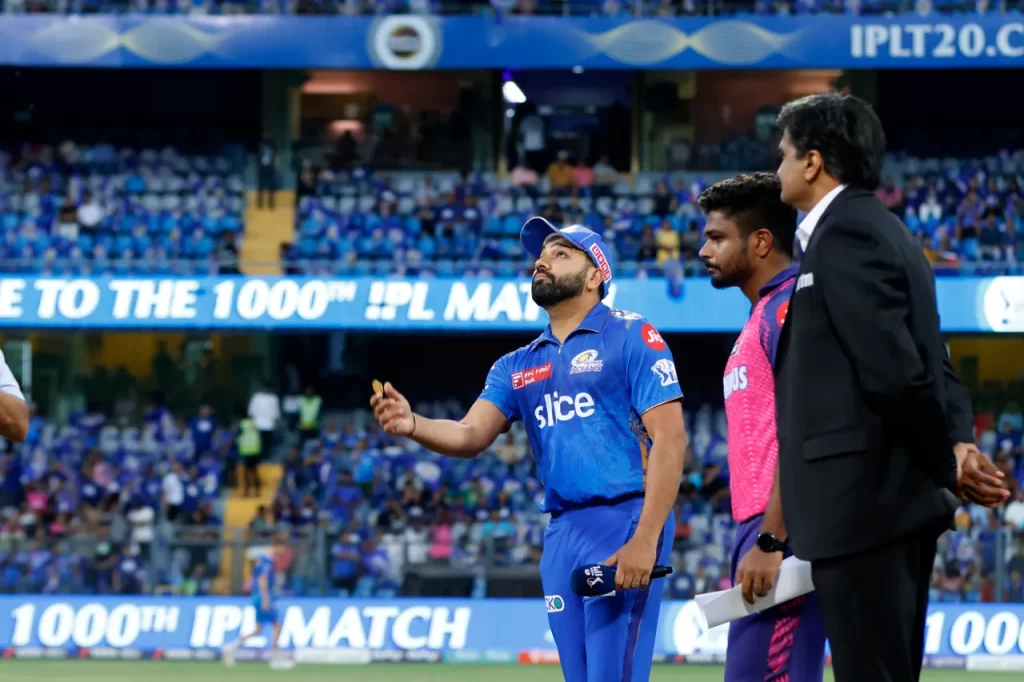
IPL's 1,000 milestone: Pride of India, envy of the rest of the world

On Sunday night, as Cameron Green bustled in to bowl to Yashasvi Jaiswal, the Indian Premier League (IPL) officially turned 1,000. A thousand matches young. Into its 16th season, the world’s premier T20 league witnessed a contest befitting the occasion, Tim David’s hat-trick of sixes in the final over from Jason Holder rounding off a day of tremendous excitement and four totals in excess of 200 in as many innings.
The events of Sunday, when Punjab Kings pulled off a last-ball heist at Chepauk against Chennai Super Kings and Mumbai Indians broke Rajasthan Royals hearts at the Wankhede, perfectly summed up why the IPL has grown to become the behemoth it is. Packed gatherings in Chennai and Mumbai were treated to sumptuous displays of batsmanship and extraordinary catches, and while the overseas stars played their parts, homegrown contributions weren’t far behind.
A boon for Indian talent

No one illustrated the platform the IPL provides for burgeoning Indian talent to express itself better than Jaiswal, the young opener from Mumbai who was ripping the franchise representing the financial capital of India to shreds in a wonderful exhibition of skill and temperament and classicism and unorthodoxy. It won’t be long before Jaiswal’s name crops up when India’s national selectors sit to discuss options for next year’s T20 World Cup. Should he make the cut, Jaiswal won’t be the first to have taken the IPL route to international cricket.
Also read: IPL 2023 | MI vs RR highlights: Records broken in IPL’s 1,000th match
The massive sense of anticipation that greeted the inaugural IPL fixture, in April 2008, between Royal Challengers Bangalore and Kolkata Knight Riders, was tinged with dollops of apprehension because few could have genuinely predicted how the product would be received by the audiences. True, India’s unexpected triumph in the inaugural T20 World Cup in South Africa a little over six months previously had provided the 20-over tournament an unexpected and timely fillip, but how would the fans react to franchise cricket? Would team loyalty ever become a factor? Could CSK, for instance, strike a chord in the Chennai and Tamil Nadu fans despite not boasting any big name from the state? What about Rajasthan Royals, representing a state that didn’t possess the same cricketing pedigree as Mumbai or Karnataka? Would spectators take kindly to, say, local lad Virat Kohli representing RCB put Delhi Daredevils (as they were then known) to the sword at the Ferozeshah Kotla?
So many questions. What would the answers be like?
They were just what the organisers and the broadcasters and the other primary stakeholders of the league had envisaged. For the duration of the IPL, domicile and such mundane issues went out of the window. It was not long before Kohli became Bengaluru’s favourite adopted son; and even earlier Dhoni was the toast of Chennai, the uncut gem from the cricketing outpost of Ranchi, flashy and flamboyant and full of energy surging into the hearts and minds and imaginations of even the most conservative and most conventional Chennai resident.
Pride of India
From a well-intentioned, ambitious and optimistic endeavour, the IPL has snowballed into an entity that is the pride of India and the envy of the rest of the world. Staged with clockwork precision and finding the enterprise and the resources to conduct it even in trying circumstances – like the general elections in 2009 and 2014, or the pandemic that forced the event out of India for the entirety of the 2020 season and the second half of the 2021 stanza – it has continued to attract the best in the business through its irresistible combination of high-octane action and the allure of big bucks that quickly converted the sceptical into believers.
It was inevitable, given the congregation of the wealth of cricketing talent, that the IPL would continue to grow despite significant bumps along the way, including the spot-fixing and betting scandals of 2013 that set in motion a chain of events culminating in ban on a few players (including former international S Sreesanth) and the suspension from the league for two years of Chennai Super Kings and Rajasthan Royals, whose owners were found to have been betting on matches involving their teams, contrary to the rules laid out by the tournament.
The naysayers
Understandably, the IPL isn’t everyone’s cup of tea. The contrarians within the country are happy to blame it for all the ills in the universe while to a wider world that has watched India’s ascension as the number one cricket destination with scarcely concealed distaste and no little envy, the IPL looms as the biggest threat to Test cricket, the ultimate format that examines skill and staying power and concentration and commitment and desire and character in conditions that vary from country to country; indeed from one city to another within the same nation. That several of the IPL team owners have now spread their tentacles and own franchises elsewhere – all teams in the South African tournament are owned by Indians, as are several in the Caribbean Premier League – is being projected as another sticky point, giving IPL team owners a monopoly and a power that, the doomsday predictors say, is threatening the core fibre of the sport.
Many of those end-of-Test-cricket predictions are both premature and exaggerated, though it is possible that if the administrators who govern country vs country cricket aren’t proactive, Test cricket could be in serious danger – with or without the IPL. What is no longer in danger is emerging Indian talent slipping through the cracks, because even if some of the truly gifted somehow don’t make their state sides, they are bound to catch the eye of the talent scouts that have become such a key cog in the IPL wheel.
Also hear: IPL 2023 | Week 5 review: Dhoni’s sixes, 1,000th IPL game, record totals
Springboard for the talented
For all his exploits in first-class cricket – he already had 50 Ranji Trophy victims when he first played for CSK – R Ashwin became a household name only after he started playing in the IPL, the first but not the only contribution of the league to the national side. A host of players were pitchforked into contention thanks to their exploits for their franchises, among them Ashwin’s spin twin Ravindra Jadeja, as well as Hardik Pandya and Jasprit Bumrah, thereby reinforcing the IPL’s avowed mantra to identify, foster and nurture Indian talent.
The first thousand out of the way, it’s guaranteed that the next won’t be another 16 seasons in coming because editions are certain to get longer. And more likely than not, another cracking contest will celebrate that next milestone, too.

